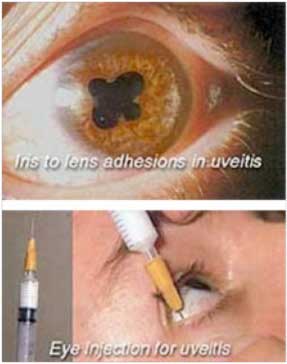Your Eyes, Our Passion
How Is Uveitis Treated?
The treatment of uveitis requires therapy to halt the inflammation of the uveal tract along with a search for the cause of the condition. Diagnostic tests may be needed to determine possible causes. The results of these tests are very important for proper treatment to be given. Medical treatment of uveitis must be aggressive to prevent glaucoma, to prevent scarring of the structures inside the eye and to prevent possible blindness.
Different medications are used to control the original cause of the uveitis, if detected, and to minimize the inflammation itself. Eye drops, especially steroids (to reduce inflammation and pain) and pupil dilators (to widen the pupil and relax the muscles within the eye), are the main medications used to treat uveitis. For deeper inflammation, oral medication or injections around the eye may be necessary, especially sub-Tenons’ injection of depot steroids.
Sometimes if the inflammation is more prolonged or vision threatening then systemic steroids may be required. These drugs quickly control inflammation in a large proportion of patients. However, if used for longer periods these drugs cause weight gain and water retention, acne formation, osteoporosis and gastric ulcers, and require to be minimized during treatment.
Rarely if very prolonged systemic steroid treatment is required it may not be possible to do so because of the enumerated side effects. In such a situation, a patient may be switched over to special medicines called immunosuppressive agents. When given in low doses, these drugs decrease the number of white cells, which are the mediators of inflammation. These drugs, such as, Methotrexate, Azathioprine and Cellcept have different side effects including decreasing blood counts and mild liver and kidney dysfunction, which are partially reversible on stopping treatment. These can be detedcted by frequent blood tests and being under the care of a physician or immunologist.
Complications of uveitis such as glaucoma, cataracts, or new blood vessel formation (neovascularization), also may need treatment in the course of the disease. If complications are advanced, conventional surgery or laser surgery may be necessary.

Request a call back
I agree to recieve more information regarding services and offers at shroff eye center via SMS and Email
Disclaimer
This is not medical advice. Your ophthalmologist will help you decide which procedure and lens is best suited for your eyes. Every patient and eye is different and thus the experience for every patient is variable.
All product and company names are trademarks or registered trademarks of their respective holders. Use of them does not imply any affiliation or endorsement by them.

By being on the website, your personal data is being processed for communication with you and providing services. We use cookies to collect and analyse information on site performance, usage, enhancement of customer usability and improvising the website. We have put in place terms of use,
By clicking on accept you agree to all the policies mentioned above. You can read more about them by clicking on read more and accept them individually.








 Call us
Call us Email us
Email us


